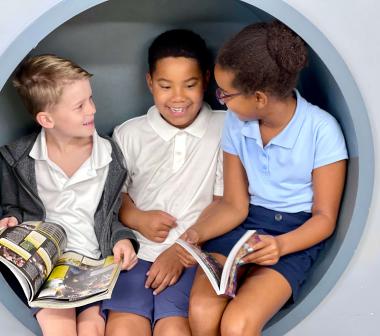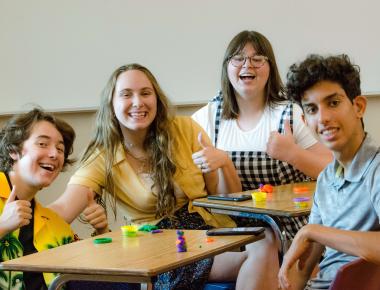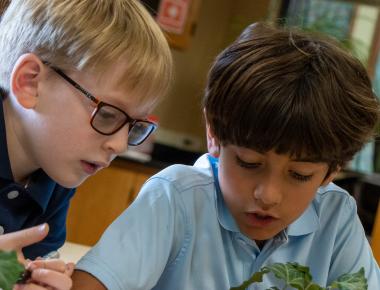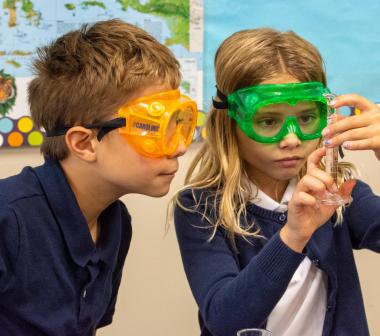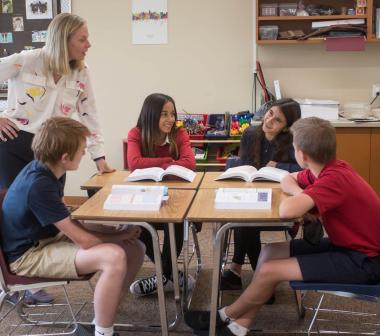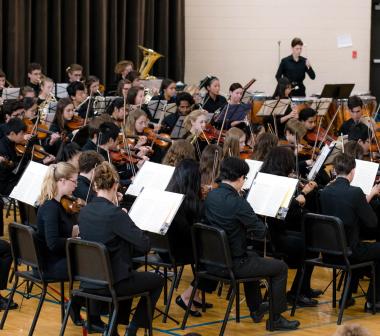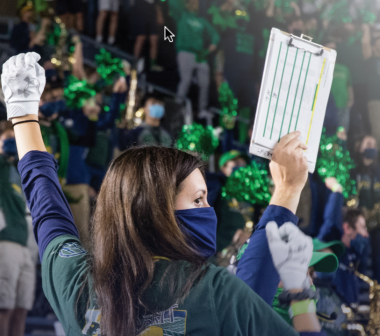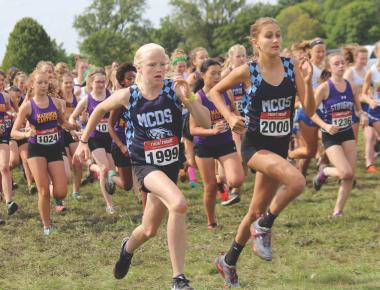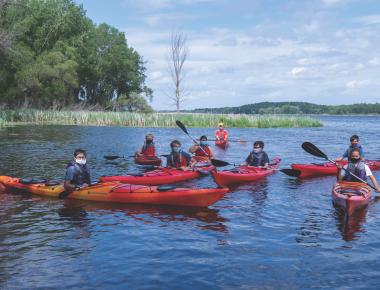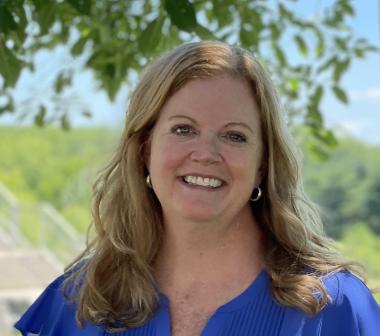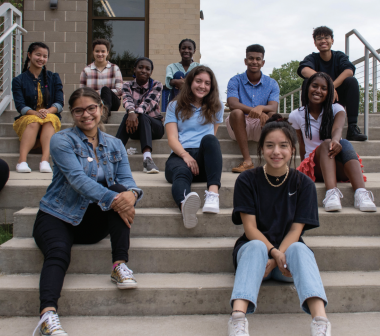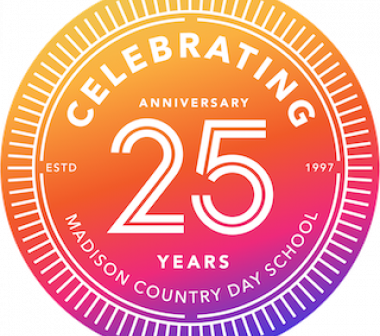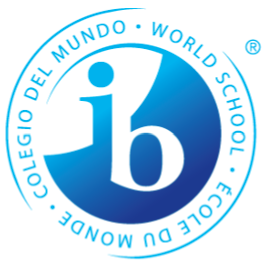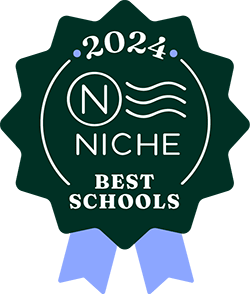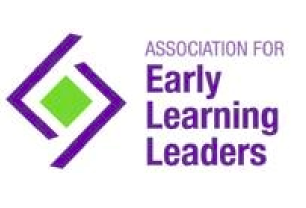Middle School
Grade 8
In eighth grade, the academic journey expands as students take on in-depth academic projects, gain confidence in Socratic seminar-style classes that build analytical and discussion skills, try new activities, and persevere to achieve personal goals. Eighth grade is also a critical developmental time for connecting individual behaviors with their effect on the wider community. With support and encouragement eighth grade students have the benefit of striving to reach their social, emotional, and academic potential in a safe and nurturing environment.
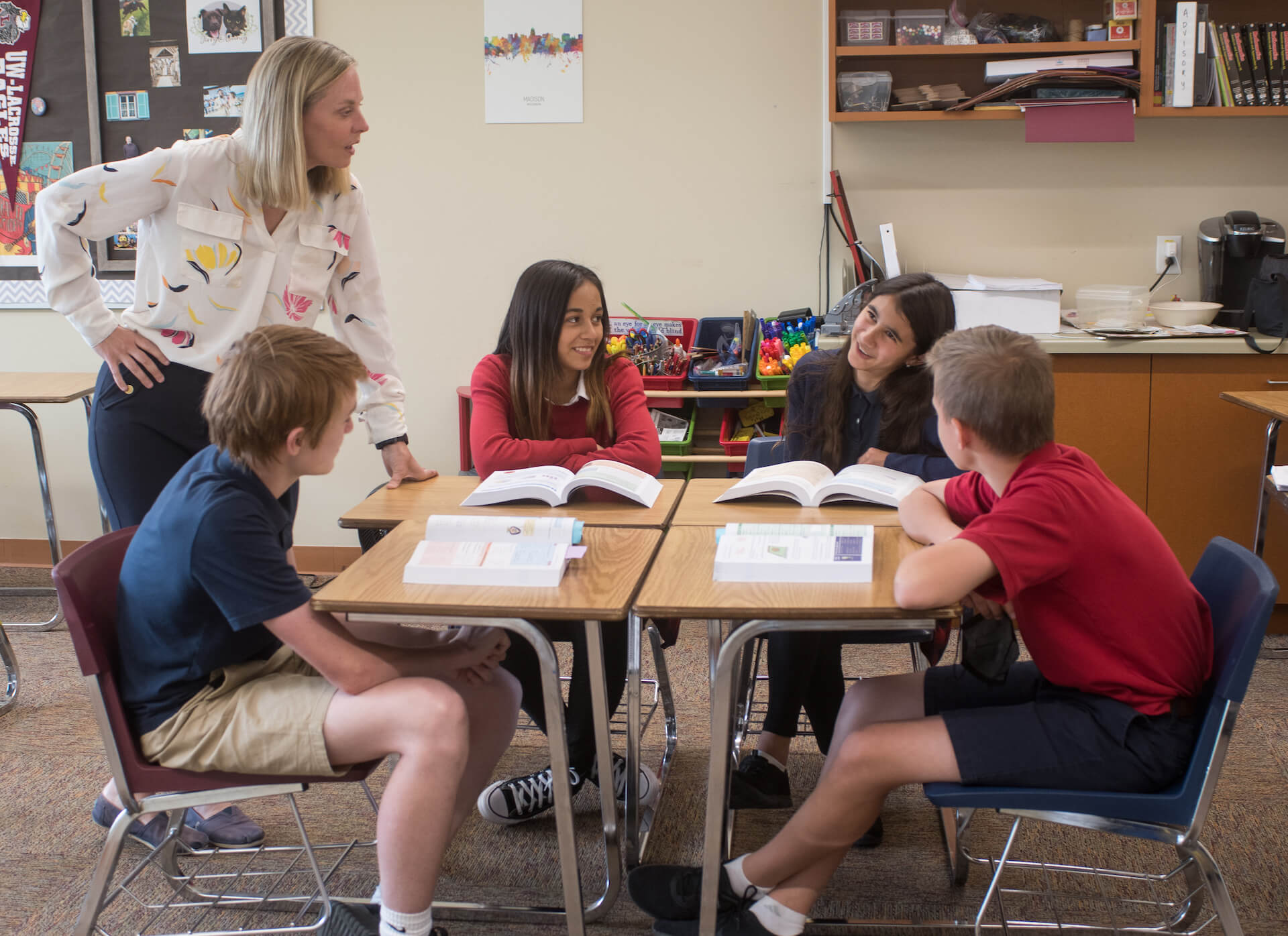
Grade 8 Curriculum:
English
Who am I? is the essential question that guides eighth grade students throughout the year as they continue to explore and develop their lives as readers and writers. Students continue to expand their skills as readers and writers through practice and discussion of the MCDS Writing Process and reading comprehension strategies. Students study the qualities of great writing, analyzing stylistic choices authors make and experimenting with these in their own writing. To further develop their writing and vocabulary skills, students study grammar and word stems. Students seek feedback on their writing in writing conferences with the teacher and peers. To facilitate the IB Learner Traits of Communicators and Risk-Takers, eighth graders work on public speaking skills and are encouraged to share their work with a larger audience by entering local, state, and national writing contests. As readers, students self-select fiction and non-fiction to read independently while also reading challenging literature as a whole class. Whole class texts include George Orwell’s Animal Farm, Shakespeare’s The Tragedy of Julius Caesar, and Elie Wiesel’s Night. Analysis and discussion of common texts occurs in a seminar format.
Mathematics
IB Integrated Math 4
*Prerequisite: IB Math 3 Extended & Teacher Recommendation
Students taking Integrated Math 4 in middle school need to be very familiar with solving linear equations, writing linear functions in different forms, and problem-solving. Students begin to explore mathematical skills in more depth and complexity, and are able to more independently investigate patterns and write generalizations. During this course students will study: Linear Functions and Coordinate Geometry, Radical Expressions, Laws of Indices, Quadratic Functions, Congruence and Similarity, and Trigonometric Ratios.
IB Integrated Math Foundations
*Prerequisite: IB Math 3
Students in IB Integrated Math Foundations will begin to explore mathematical skills in more depth and complexity. This course is designed to allow students the opportunity to demonstrate their mathematical understanding in four distinct areas – knowing and understanding, investigating patterns, communicating and applying maths in real-life contexts. The course is designed to review previously studied mathematical concepts and also introduce students to new ideas and skills. During this course students will study: Integers, Laws of Algebra, Linear Equations and Inequalities, Coordinate Geometry, Systems of Equations, Transformation Geometry, and Financial Mathematics.
Science
The eighth grade science curriculum continues to take the student on a more focused look at Earth, physical, and life science concepts. The year begins by learning about weather, its driving mechanisms, and how to predict it. With an eye to the sky, students explore celestial movement and the laws that govern this motion. Next, they explore the respiratory, circulatory, and finally, the nervous systems. In this year, students also construct a research paper, including all aspects of such a project from defining a topic to researching to writing. During all of this, the MYP criteria form the bones of what we do. Emphasis is placed on students knowing information as well as being able to conduct rigorous experimental work and reflect on the impacts of science.
History
Eighth grade history is a world history course that spans from industrialization to World War II. The key concept at the center of this course is systems and how they adapt, change, compete, or cooperate within the historical time frame. Students build knowledge and understanding, investigate, communicate their findings to a variety of audiences, and think critically. This inquiry-based class asks students to interpret and analyze historical sources, examine events through multiple perspectives, develop and debate historical claims, and participate in class discussions that push their thinking.
Spanish
In the Middle School language acquisition class, we believe language is an essential tool to develop students’ intercultural awareness. Global citizens are those who accept and respect different perspectives in order to have a better understanding of the world. Acquiring a new language is the best way to be exposed to other cultures and understand, accept, and appreciate differences. The main goal of this class is to develop all language skills: writing, listening, speaking, reading, viewing, and interpreting. Students aim to achieve communicative competence by actively participating in class using a communicative approach. Students are encouraged to use the target language in real-life contexts according to their age and proficiency level. In eighth-grade Spanish class, students will continue to develop the language by exploring how to take care of themselves and the environment, and how to be a responsible cyber-citizen. Some of the topics include Health, Taking Care of Our Planet, Social Media, and Traveling. Grammar focuses on the use of the Subjunctive and the Conditional modes. Additionally, students will be introduced to the Future Tense and will be able to express opinions and give positive and negative commands.
Music
The Madison Country Day School Music Department strives to provide a comprehensive music education for each child, promoting a balance of discipline, creativity, and aesthetic understanding.
Throughout middle school, students receive private or semi-private music lessons on their chosen instrument (piano, voice, violin, viola, cello, bass, trumpet, trombone, french horn, oboe, clarinet, saxophone, flute, or percussion). These lessons occur during the school day and are included in tuition. All eighth students participate in a combined seventh and eighth grade ensemble (band, choir, or orchestra) determined by their instrument. These young musicians perform in a Winter and Spring concert and can also participate in two recitals each year. Depending on their ensemble, students have other performance opportunities, both on and off campus. Seventh and eighth grade students receive designated music theory instruction time during their ensembles. Units include major vs. minor tonality, musical form, and simple vs. compound meter. A major highlight is the annual composition unit. MCDS music students grades 5-12 are given an account with Noteflight, a web-based notation software, which they use for composition as well as music assessments. Eighth grade students also have the option to participate in WSMA Solo and Ensemble Festival.
Art
Middle school art consists of studio work with a variety of different artistic mediums, completing written artist statements for an online portfolio, and group critiques to learn how to talk about artwork. Students are able to accurately use the elements and principles of art and design to describe their artwork as well as other students’ artwork. We will be exploring a variety of topics in art this year including, but not limited to, art history, artist studies, learning about new techniques to use with a variety of mediums, and student choice projects. These choice projects will have a theme or topic to guide students along their artistic journey. Once projects are completed, students will share how and why they chose to create their art and how it fits into the theme or topic, allowing for more individual expression and interpretation.
Physical Education
In eighth grade students will describe and demonstrate strategies to enhance interpersonal skills, demonstrate and apply a range of skills and techniques, design and explain a plan for improving physical performance and health, and apply physical and health education knowledge to explain issues and solve problems set in familiar and unfamiliar situations. Some of the activities that are covered are flag football, floor hockey, pickleball, lacrosse, competitive games, soccer, ultimate frisbee, health, golf, cricket, among others. Students will also continue to develop positive interpersonal bonds and a better sense of social responsibility.



